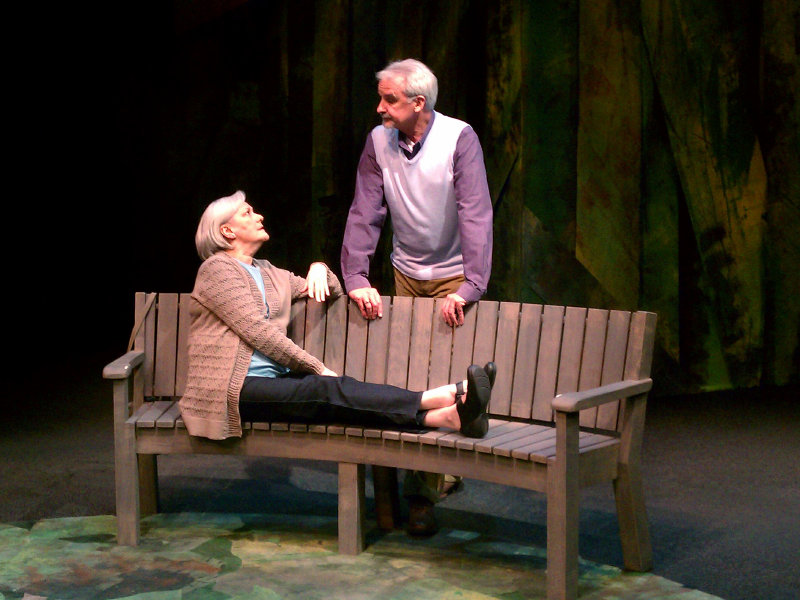All playwrights should be as lucky as Richard Lyons Conlon. The Chicago dramatist's two-character play, "One Time," is receiving its debut production with Linda Stephens and Jonathan Gillard Daly as its cast.
The veteran actors are in the Next Act Theatre staging that opened last weekend, and they are quite wonderful.
Fresh and clever, "One Time" takes an inventive approach to an achingly human subject that has certainly been addressed in literature, film and theater many times in the past. Romance and love is at the mercy of timing and circumstance.
The play is touching and engaging, and these actors lift it to its full affecting potential.
"One Time" is set on and around a park bench. A man and a woman, graying and approaching their social security years, begin meeting there once a week to disclose small tidbits about themselves.
The meetings have a format. Each individual tells a single personal story, beginning with the phrase "one time."
A larger picture gradually emerges, and revealing more than that would get us into spoiler territory. Playwright Conlon skillfully builds the drama of his piece, making us inch forward toward the edges of our seats as the overall tale unfurls.
Stephens and Daly fit "One Time" so well, it could have been written for them. Their characters are smart common folks, and the actors contribute depth and nuance.
The woman played by Stephens possesses a pained reserve that suggests old wounds not entirely healed. A lot is brewing beneath that restrained exterior.
Daly reflects the male gender in portraying his character as an antsy and overeager over-aged puppy, impatient with any pace but full speed ahead. "Do you ever stop being a teenager?" he convincingly asks in a burst of frustration with himself. But Daly also conveys the vulnerability necessary to make "One Time" succeed.
David Cecsarini directed.
"West Side Story"
The national touring company production of "West Side Story" that arrived at the Marcus Center Tuesday is NOT your everyday retread of a dusty old musical theater classic. It has its own exciting personality.
Consider this:
- A 17-piece orchestra accompanies the show. This is a big deal in an era of small combos electronically reproducing the orchestral sound written for mid-20th century musicals. There is a complexity and lushness coming from the Uihlein Hall pit that is seldom heard in road show productions these days.
- Jerome Robbins' balletic choreography has been carefully and energetically replicated, reminding us what a glorious dance musical "West Side Story" is. Over the decades of amateur and regional theater productions, we have lost sight of this. Seeing the original choreography done well with the sizable orchestra is alone worth the price of admission.
- In Ross Lekites and Evy Ortiz, the company has a Tony and Maria who sing like angels. Most of us know the score so well, the cast albums of the original Broadway company and the movie adaptation play in our heads. This couple matches the solos and duets that have been burnished by time in our brains.
Ortiz is a tiny and girlish chiquita who startles the ears with her big and gorgeous voice.
The strength of Lekites and Ortiz is important here, because the tone of the show has shifted in this revival. Sweet totally trumps nasty.
Gang grittiness has disappeared, with the fatal rumble being used as just a musical theater fantasy plot device. The Sharks and the Jets appear to be harmless and inspire no fear. We are definitely seeing a kinder and gentler "West Side Story."
The production is all about Tony and Maria, who are played as the suburban kids next door. The change in emphasis may upset purists, but with Lekites and Ortiz singing their hearts out, it works. The final scene is genuinely moving.
It's interesting to note that as most of the venom has been drained from this revival, the show has acquired a more ethnic flavor, thanks to the increased use of Spanish in the dialog. Don't worry. If you don't habla espanol, you will still understand.
Damien has been around so long, he was at Summerfest the night George Carlin was arrested for speaking the seven dirty words you can't say on TV. He was also at the Uptown Theatre the night Bruce Springsteen's first Milwaukee concert was interrupted for three hours by a bomb scare. Damien was reviewing the concert for the Milwaukee Journal. He wrote for the Journal and Journal Sentinel for 37 years, the last 29 as theater critic.
During those years, Damien served two terms on the board of the American Theatre Critics Association, a term on the board of the association's foundation, and he studied the Latinization of American culture in a University of Southern California fellowship program. Damien also hosted his own arts radio program, "Milwaukee Presents with Damien Jaques," on WHAD for eight years.
Travel, books and, not surprisingly, theater top the list of Damien's interests. A news junkie, he is particularly plugged into politics and international affairs, but he also closely follows the Brewers, Packers and Marquette baskeball. Damien lives downtown, within easy walking distance of most of the theaters he attends.







